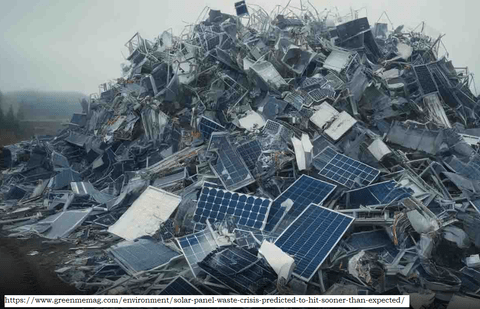Chris Edwards
President-elect Trump is moving quickly to choose cabinet members and announce his priorities for next year. Tax policy will be on the agenda, including scaling back the green energy tax subsidies passed in the 2022 Inflation Reduction Act (IRA). The tax subsidies have ballooned in cost from $390 billion over 10 years to more than $1 trillion.
Green energy is costly to the federal budget, but it also imposes costs on the environment. Last week, I examined the Biden plan to cover Western public lands with 538,000 football fields worth of metal-and-glass solar panels.
Another environmental issue is green energy trash. Solar panels, wind turbines, and lithium batteries have limited lifespans, are only partly recyclable, and create disposal problems down the road. Federal policymakers need to balance the potential CO2 benefits of these technologies with the collateral damage, including the disposal problems.
Solar panels have a 25- to 30-year lifespan, and many panels could be replaced earlier for economic reasons. There are already hundreds of millions of solar panels installed across the country. By the late 2020s, we will start seeing vast amounts of trashed solar panels, which contain glass, silicon, copper, aluminum, plastic, silver, and other materials. Currently, 90 percent of used solar panels are landfilled rather than being recycled.
What happens down the road if 538,000 football fields in the West are indeed covered with solar panels? Let’s say that nuclear power or another energy source evolves as a better option than large-array solar. If solar companies abandon their used structures on vast stretches of public lands, who will clean them up?
There are similar problems with wind turbines. They have a lifespan of about 20 years, and they can fail early, so there will be increasing amounts of windmill scrap to deal with. Turbine blades are generally made of fiberglass, are nondegradable, and are not easy to recycle. So used blades are starting to pile up, such as in two junkyards covering more than 30 acres in Sweetwater, Texas. There are also windmill blade dumps in Iowa and Grand Meadow, Minnesota.
What if economics turns against wind power in coming years? Maybe rooftop solar becomes a superior option, and we are left with vast numbers of worn-out windmill towers blotting the nation’s landscape. Who will dismantle them? The company with the junkyards in Sweetwater has broken promises to clean up its windmill mess.
A coal power plant near me operated 63 years before closing, and the structure will be demolished and replaced by residential and commercial buildings. The plant covered just 18 acres, so replacement is straightforward, but vast arrays of solar panels and wind turbines have shorter lives and create larger end-of-life problems.
Lithium batteries are the central component of electric vehicles (EVs) and large grid storage systems. The lifespan of EV batteries is 10 to 20 years. Dismantling and recycling the battery materials is difficult, and the great majority of EV batteries are currently not recycled. There are differing views about the feasibility of recycling—this article says that lithium batteries are an “environmental time bomb,” whereas this article is more optimistic.
Dumping EV batteries into landfills creates risks of contaminating soil and groundwater with metals. Lithium batteries also catch fire, which are difficult to extinguish and can emit toxic fumes. There are stories across the nation about battery fires in landfills.
The environmental impacts of green energy are complex and need to be fully debated in Congress. The debate next year over the IRA’s tax subsidies is a good time to probe these green trash issues. Will taxpayers be asked to subsidize the costly recycling or landfilling of solar panels, wind turbines, and batteries? Will taxpayers have to pay for the removal of vast arrays of solar panels and wind turbines? As the energy footprint of wind, solar, and lithium batteries expands, the costs and environmental effects loom larger.
Cato scholars discuss the IRA green subsidies here and here.

